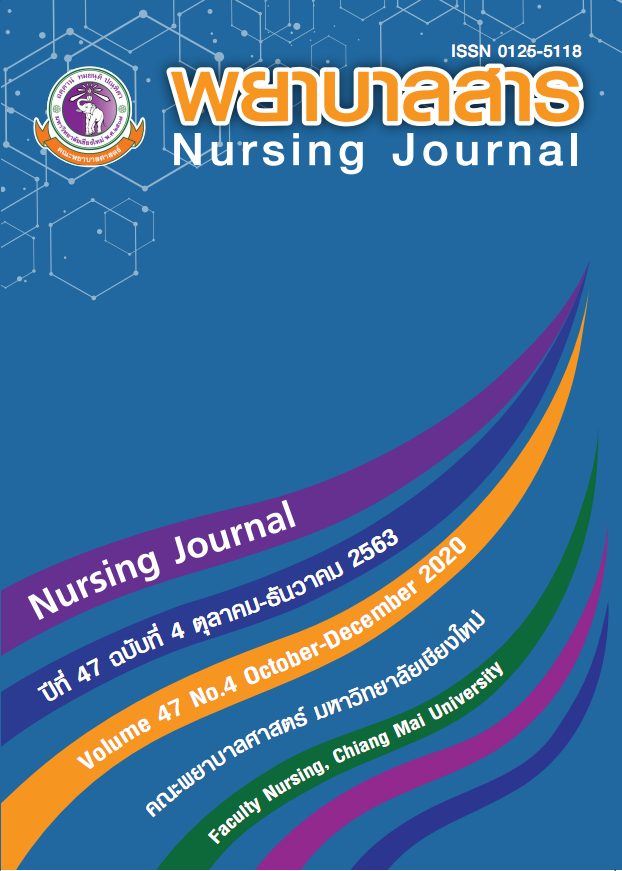Factors Related to Self – Management Behaviors of Highlanders with Chronic Obstructive Pulmonary Disease
Keywords:
Self-Management Behaviors, Related Factors, Highlanders, Chronic Obstructive Pulmonary DiseaseAbstract
Self-management behavior is of vital importance in persons with chronic obstructive pulmonary disease for controlling symptoms by themselves. The purpose of this descriptive research study was to examine factors related to the self-management behaviors of highlanders with chronic obstructive pulmonary disease. The sample consisted of 110 highlanders receiving care at the COPD clinic of Maesuai Hospital in Chiang Rai province. The subjects were selected based on the inclusion criteria. Research instruments were interviewed forms including a personal data form, a self-management behavior scale, a knowledge scale, and a social support scale. The content validity showed values of 0.95, 0.91, and 0.94 for each scale, respectively. The reliability of all questionnaires demonstrated values of 0.78, 0.82, and 0.96, respectively. Data were analyzed using descriptive statistics and Pearson’s product moment correlation coefficient.
The results of the study were as follows.
The average score for overall self-management behaviors was high at 4.31 (S.D. = 0.40), with sub-dimensions including medical self-management, role management, and emotional management behaviors also high at 3.71 (S.D. = 0.70), 4.70 (S.D. = 0.40), and 4.53 (S.D. = 0.46), respectively. The average score for overall knowledge on disease and self–management practices was at a high level, 0.82 (S.D. = 0.12), with sub-dimensions including medical self-management and emotional management also high at 0.85 (S.D. = 0.15) and 0.89 (S.D. = 0.15). The mean for the dimension of knowledge on disease and role were at a moderate level, 0.65 (S.D. = 0.18) and 0.67 (S.D. = 0.21), and the average social support scores were high at 3.48 (S.D. = 0.38). Knowledge on disease and self-management practices had a low positive correlation with self-management behaviors, while social support had a moderate positive correlation with self-management behaviors (r = .292 and .315, p < .01, respectively).
References
Ardkhitkarn, S. (2012). Self-Management behaviors and predicting factors in elders with end stage renal disease undergoing continuous ambulatory peritoneal dialysis (Master’s thesis, Chiangmai University). (In Thai)
Artpadungkul, D. (2008). Needs of social support among patients with chronic obstructive pulmonary disease during dyspnea in Pua Crown Prince Hospital, Nan province (Master’s thesis, Chiangmai University). (In Thai)
Barnett, M. (2011). COPD: Implementing NICE guidance. Journal of Community Nursing, 25(2), 4-14.
Boonsung, P. (2012). Effectiveness of self-management educational program for chronic obstructive pulmonary disease patients at Rongkwang Hospital, Phrae Province (Master’s thesis, Chiangmai University). (In Thai)
Bunsawat, W. (2005). Guidelines for the treatment of chronic obstructive pulmonary diseasepatients. Khonkaen: Department of Medicine, Faculty of Medicine Khonkaen University. (In Thai)
Chronic Obstructive Pulmonary Disease Clinic of Maesuai Hospital. (2017). Annual Report 2012-2017. Chiangrai: Mae Suai Hospital. (In Thai)
Creer, L. T. (2000). Self-management of chronic illness. In M. Boekaerts, P. R. Pintrich, & Zeidner, M. (Eds.), Handbook of self-regulation (pp. 601-629). California: Academic.
Elkington, H., Patrick, W., Addington-Hall, J., Higgs, R., & Edmonds, P. (2005). The healthcare needs of chronic obstructive pulmonary disease patients in the last year of life.Palliative Medicine, 19(6), 485-491.
Global Initiative for Chronic Obstructive Lung Disease. (2014). Pocket guide to globalstrategy for the diagnosis, management, and prevention of chronic obstructive pulmonary disease. Retrieved from http://www.goldcopd.org
Global Initiative for Chronic Obstructive Lung Disease. (2017). Pocket guide to global strategy for the diagnosis, management, and prevention of chronic obstructive pulmonary disease. Retrieved from http://www.goldcopd.org
House, J. S. (1981). Work stress and social support. New Jersey: Prentice-Hall.
Klinklom, S. (2014). Self-management behaviors and related factors among older persons with benign prostatic hyperplasia (Master’s thesis, Chiangmai University). (In Thai)
Lorig, K., & Holman, H. (2003). Self-management education: History, definition, outcomes, and mechanisms. Annals of Behavioral Medicine, 26(1), 1-7.
Luangpitak, S. (2015). Factors influencing self-management among patients with heart Failure (Master’s thesis, Burapha University). (In Thai)
National Health Security Office. (2017). Health statistics. Retrieved from http://www.nhso.go.th/frontend/NewsInformationDetail.aspx?newsid=Njgy (In Thai)
Pomyen, S. (1996). Effect of dyspnea management promotion program on quality of life among persons with chronic obstructive pulmonary disease (Master’s thesis, Chiangmai University). (In Thai)
Ries, A. L. (2006). Impact of self-management chronic obstructive pulmonary disease on quality of life: The role of dyspnea. The American Journal of Medicine, 119(10), 12-20.
Thanawong, L. (2016). Effects of a Self-management promotion in pulmonary rehabilitation on functional capacity and health care utilization among persons with chronic obstructive pulmonary disease. Nursing Journal, 43(2), 45-55. (In Thai)
Thoracic Society of Thailand. (2005). Guidelines for diagnosis and treatment of chronic obstructive pulmonary disease in the country. Bangkok: The Medical Association of Thai. (In Thai)
Thorndike, R. M. (1978). Correlational procedure for research. New York: Gardner Press.
Wangsom, A. (2016). Dyspnea management in patients with chronic obstructive pulmonary disease. Thai journal of Cardio-thoracic Nursing, 27(1), 2-10. (In Thai)
Downloads
Published
How to Cite
Issue
Section
License
บทความที่ได้รับการตีพิมพ์เป็นลิขสิทธิ์ของวารสารพยาบาลสาร
ข้อความที่ปรากฏในบทความแต่ละเรื่องในวารสารวิชาการเล่มนี้เป็นความคิดเห็นส่วนตัวของผู้เขียนแต่ละท่านไม่เกี่ยวข้องกับมหาวิทยาลัยเชียงใหม่ และคณาจารย์ท่านอื่นๆในมหาวิทยาลัยฯ แต่อย่างใด ความรับผิดชอบองค์ประกอบทั้งหมดของบทความแต่ละเรื่องเป็นของผู้เขียนแต่ละท่าน หากมีความผิดพลาดใด ๆ ผู้เขียนแต่ละท่านจะรับผิดชอบบทความของตนเองแต่ผู้เดียว






